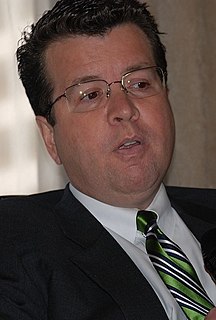A Quote by Nouriel Roubini
The U.S. has been living in a situation of excesses for too long. Consumers were out spending more than their income and the country was spending more than its income, running up large current-account deficits. Now we have to tighten our belts and save more.
Related Quotes
Is it just a coincidence that as the portion of our income spent on food has declined, spending on health care has soared? In 1960 Americans spent 17.5 percent of their income on food and 5.2 percent of national income on health care. Since then, those numbers have flipped: Spending on food has fallen to 9.9 percent, while spending on heath care has climbed to 16 percent of national income. I have to think that by spending a little more on healthier food we could reduce the amount we have to spend on heath care.
An economy cannot long remain prosperous by government's taxing and spending more, now absorbing national output at a rate equal to the entire income of every American living west of the Mississippi. If this trend continues, America will gradually sink into the status of a Third World nation - more unemployment, more shackles on production, more poverty.
The fears of recession in the aftermath of Black Monday have turned to fears of the economy racing ahead too fast, with inflation edging up and a substantial current account deficit... People understandably feel more confident about their future than they've done for decades, but as a result they have been borrowing more and saving less... Coming on top of a massive income investment boom, it's all been just a bit too much of a good thing.
If one sentence were to sum up the mechanism driving the Great Stagnation, it is this: Recent and current innovation is more geared to private goods than to public goods. That simple observation ties together the three major macroeconomic events of our time: growing income inequality, stagnant median income, and the financial crisis.
If the Nation is living within its income, its credit is good. If, in some crises, it lives beyond its income for a year or two, it can usually borrow temporarily at reasonable rates. But if, like a spendthrift, it throws discretion to the winds, and is willing to make no sacrifice at all in spending; if it extends its taxing to the limit of the peoples power to pay and continues to pile up deficits, then it is on the road to bankruptcy.
The standard of 'affordable' housing is that which costs roughly 30 percent or less of a family's income. Because of rising housing costs and stagnant wages, slightly more than half of all poor renting families in the country spend more than 50 percent of their income on housing costs, and at least one in four spends more than 70 percent.
Whether government finances its added spending by increasing taxes, by borrowing, or by inflating the currency, the added spending will be offset by reduced private spending. Furthermore, private spending is generally more efficient than the government spending that would replace it because people act more carefully when they spend their own money than when they spend other people's money.
The rich pay more in total taxes now than ever before - ever. It's true. Just like it's true that when the rich are convinced they're going to be taxed more, they spend less. And when the top few percenters don't spend, there goes all your spending, because they account for half of all retail spending.
Many decry rising inequality because it makes those who've fallen behind feel impoverished. But it's done much more than cause hurt feelings. It has also raised the real cost to middle-income families of achieving many basic goals. The process begins with the completely unremarkable fact that top earners have been spending at a substantially higher rate than before. They've been building bigger mansions, staging more elaborate weddings and coming-of-age parties for their kids, buying more and better of everything.



































